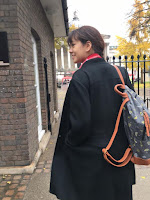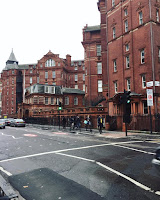On Sunday the 20th of November, I woke up at 5:30am for an early start to catch the train to London for "The Young Doctor Programme" by InvestIn Education, held in the Anatomy building at UCL (University College London).
After train delays and having to take a bus to another station, I finally arrived at Gower Street at 10am, passing the UCL Hospital and campus as I got to the Anatomy Building. I was registered and handed a booklet, while other students rushed in (also late due to trains and M3 closures).
I walked in to see a massive lecture theatre of 100+ students, and stationed myself in the seat at the right top corner of the room. The first talk was by Dr Manik about the 'World of a Doctor', speaking about the different course types (traditional, integrated and problem-based), ward duties, career options and a typical week of a junior doctor. It was very insightful, and made me very excited for the years ahead.
Dr Manik then spoke of current issues facing the NHS, such as the junior doctor dispute, A&E waiting times and working weekends. It was so interesting to be up to date in the knowledge of what's facing doctors right now, and really getting to understand the politics and ethics involved with working in the National Health Service.
At 11:30am, Dr Stef ran the "Hour in A&E" practical segment of the programme, where we were presented with case studies of possible patients and problems, letting us know what to ask patients (Medical history? Current medication? Smoker/drinker?) and then getting the chance to discuss differential working-diagnosises and what tests to do; then ultimately what treatment we think we should assign. We did this for a heart attack and fracture patient, and I loved learning about the different types of procedures (such as ECG and echo). The doctors were even kind enough to tell us some funny experiences they'd had with patients, such as fake comas and falling onto toilet brushes.

At the lunch break, my friends from secondary school and I walked into town to find somewhere to sit and eat. I loved the beauty and diversity of London, and while sitting in Starbucks eating a sandwich it felt very homey to be looking out into the city with it's Christmas lights and busy chatter.
After walking back to UCL (which only took 5 minutes from town!) we had our second practical of suturing by Mr Aaron. We were each given an orange and needle, and forceps and scissors one between two. It was easier than I thought, after learning how to correctly hold and use the equipment from watching the demonstration projected onto the screen at the front, while Mr Aaron did the suturing under a camera. Me and the girl next to me, named Marta from Poland, both found this our favourite part as we laughed trying to thumble over the needle and thread. I'm now a proud owner of a sutured orange kindly named "Orlando" by my Dad.


3pm was the start of the presentation about applying to medical schools, ran by ex-Oxbridge students Dr Jonathan and Emily. This was the longest presentation, but possibly the most useful (if I had to pick just one!). We were led through the UCAS application process of personal statements and aptitude tests (BMAT/UKCAT), as well as being given advice for standing out and putting across our passion for medicine in our applications. They also showed us funny videos of mock interviews that they acted in, demonstrating a good interview candidate vs a bad one (body language, thought process..etc). There was so much valuable information, I'm so thankful.
The last segment of the programme ran from 5-6pm, and it was an open pannel discussion for students to ask questions and get ansers from a range of 11 different doctors! I thought this was a lovely idea, and gave us opportunities to further get informed on anything we were curious about (such as NHS vs private, studying abroad, and part-time jobs during med school).

I really thought this was such a well organised programme, with such enthusiastic and passionate doctors eager to help. We were all given copies of the presentation slides, as well as extra materials such as extra case studies, advice, example UKCAT questions and CV. We had regular breaks where we were allowed to ask questions frequently. I enjoyed every minute of the experience, and I am very grateful to InvestIn, UCL and the doctors for being so helpful. I now have 15 pages of valuable notes filled with the joys of medicine (and my not so neat note-taking handwriting!)
Overall, I'd definatley recommend the Yound Doctor Programme to other Year 12 students interested in Medicine, as it really does prepare and inform you. It is quite pricey for some though, as a ticket was £115 per person (now £120), so I'd advise you go with friends for a group discount and even tell your school/college about it as an idea for a school trip.
Find InvestIn programme options (not just medicine!)
here
Book tickets for the Young Doctor Programme
here
Look at what UCL has to offer
here

















